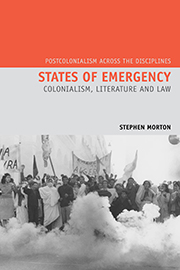2 - Terrorism, Literature and Sedition in Colonial India
from Part I
Summary
In a cartoon published in the Hindi Punch magazine entitled ‘Down with the Monster’ and dated May 1908, the Indian Viceroy Lord Minto is depicted as Hercules killing the twin-headed hydra of Indian anarchism and revolution with a club, on the side of which the words ‘LAW & ORDER’ are inscribed in capital letters. Facing this figure, on the opposite side of the cartoon, in the smoke clouds bellowing from the dying hydra's two mouths, the following words are also written in capital letters: ‘TERRORISM, SEDITION, LAWLESSNESS, and MOZUFFERPURE [sic] OUTRAGE’. At first glance, what this cartoon exemplifies is the moral authority of the British government's counter-terrorism strategy in early twentieth-century colonial Bengal; for the authority of the British Empire was clearly predicated upon the demonisation of nationalist insurgency. It is significant also that this illustration bears a striking similarity to a cartoon entitled ‘Hercules and the Hydra’ from the 12 February 1870 edition of the British Punch magazine, in which a muscular Gladstone is depicted in a loincloth preparing to fight the serpent with multiple heads labelled ‘Fenianism’ and ‘Irish Land Question’ among other ‘social problems’, such as railway reform and sanitary reform. In both of these illustrations, British colonial sovereignty is presented as a strong, heroic, masculine figure taking on a monstrous and unpredictable enemy. In this respect, the myth of Hercules and the Hydra can be seen to provide the British colonial imagination with a powerful metaphor through which to justify particular techniques of colonial governmentality and counterinsurgency.
- Type
- Chapter
- Information
- States of EmergencyColonialism, Literature and Law, pp. 61 - 86Publisher: Liverpool University PressPrint publication year: 2013

